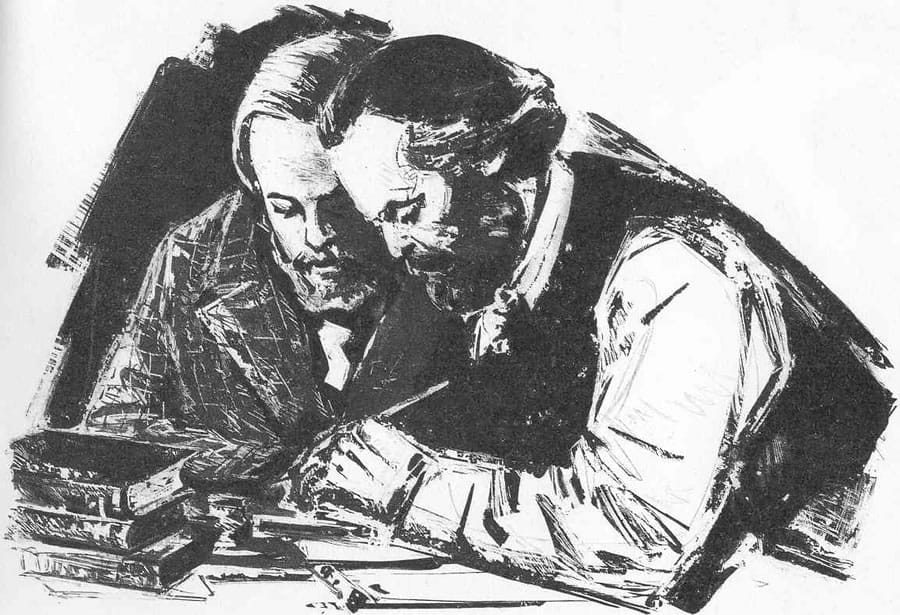
Marx Essay
Marxism as a political and ideological movement arose in the 40-s of the XIX century. At this time the worsening of the social and economic contradictions of capitalism required the new ideology and scientific theory. The Doctor of Philosophy, Karl Marx (1818 – 1883) and German businessman Friedrich Engels (1820 – 1895) solved the problem as follows: they formulated a radical scientific theory of the communist and armed with revolutionary idea the working class. The emergence of Marxism has been by prepared the previous development of the capitalist economy, the revolutionary process and social thought. The doctrine developed by Karl Marx and Friedrich Engels, was a holistic system of worldviews, orderly system of philosophy. (Tucker, 1978)
A special place in the critical views of Marx and Engels has capitalism and industrial revolution, which had great influence on the socio-economic life of Europe of that time. It is necessary to point that the fundamental step in the development of the capitalist economy was the industrial revolution, more broadly manifested in the first decades of the XIX century. It marked an unprecedented during the entire previous history rapid development of productive forces, expressed in the transition from manufactory to factory system based on widespread use of machine technology. That process led to the assertion of capitalist production relations. (Tucker, 1978)
A fundamental prerequisite for the formation of historical Marxist ideology was that capitalism had a victory over feudalism in the countries of Western Europe, and showed its economic advantage over the previous method of production. Though it also showed the inconsistency of its own development, an increasing conflict between labor and capital.
Marx analyzed the Western European capitalism in its industrial stage of development process, pointed the deepening of the contradictions between productive forces and production relations, between social production and private property. He has formulated a materialist conception of history, the theory of surplus value, and the political concept of the dictatorship of the proletariat. Having pointed the relations of production as the main (that define a set of social relations), he argued that in the history the decisive role is played by the masses, and that capitalism has a transitional role in the history, so it should be replaced by the new communist regime, which is an inevitable and logical result of the revolutionary contradictions of capitalism. (Barnett, 2009)
The substantial scientific analysis of the economic situation in capitalist society was made by Marx in the first volume of “Das Kapital”. Engels pointed out that in it Marx first analyzed the very foundations of the modern capital relations, he brought the concept of equity in agreement with the historical facts. Marks in this work discovered the laws of capitalism, showed its temporary, transient nature. Marx has scientifically proved that during the development of capitalist society its antagonistic contradictions become more acute, and that inside capitalism is objectively created a force that will destroy it – the proletariat. (Wheen, 2006)
Marx was the most severe critic of capitalism, and yet he valued its power to break down barriers and create an international system of production and consumption. In the “Communist Manifesto”, he described capitalism as a force that cancels all feudal, national, and religious identities, giving rise to universal civilization, run by the imperatives of the market. (Barnett, 2009)
Thus, according to Marxist doctrine, capitalism is characterized by:
1) capitalist private property and, above all, the means of production;
2) the exploitation of free labor, which creates added value for private capital or the aggregate in the face of the capitalist state, who own the means of production;
3) the broadest division of labor;
4) the development of major commodity production as the dominant mode of production;
5) development of commodity exchange, both within countries and on world market
6) anarchy in production due to free competition;
7) reserve army of labor (unemployment);
8) the social character of capitalist production and the private character of appropriation, stratifying society into the super-rich and the poor, giving rise to fight communist relations with the relations of the bourgeois, the struggle of the proletariat with the bourgeoisie.
The main idea of the socio – political views of Karl Marx was the fact that as a result of internal development of capitalism would be destroyed narrow class and ethnic relations, would be created conditions for liberation of men. Progress toward human liberation will go through class struggle and revolution, the destruction of one class by another, through the establishment of the power of the working class, the residual lead to the disappearance of the division of society into social classes and the emergence of a homogeneous, socially just society.
It is possible to conclude that Marxism and its political concepts was a realistic theory of the Industrial Revolution, a sharp criticism of liberalism and capitalism, an attempt to impose disparate values of the proletariat throughout the European community. In the second half of the XIXth century Marxism has spread considerably in many countries, where broke out the working class movement. Marxism has had a huge impact on the fate of civilization in the XXth century.

